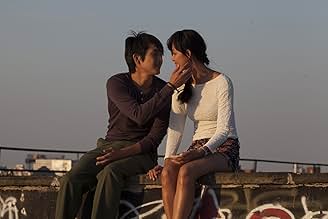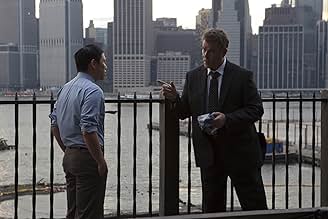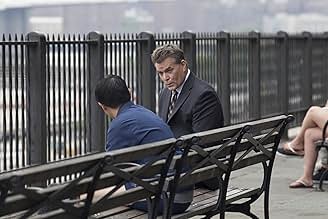VALUTAZIONE IMDb
5,3/10
4422
LA TUA VALUTAZIONE
Due migliori amici salgono tra i ranghi della malavita cinese di New York negli anni '80.Due migliori amici salgono tra i ranghi della malavita cinese di New York negli anni '80.Due migliori amici salgono tra i ranghi della malavita cinese di New York negli anni '80.
- Regia
- Sceneggiatura
- Star
Jin Au-Yeung
- Detective Tang
- (as Jin Auyeung)
Recensioni in evidenza
Traveling across an ocean or desert and into a new country, one becomes subject to different rules, and vulnerable to thugs who know the system better. Those unable or unwilling to control their own destinies in this new climate, invite others to do it for them. "Captain leads, sailor sails," is the saying, and some unsavory, yet deceptively wholesome looking, captains appear at the helm. The American dream depends more on one's luck, resources and strength of character, than on equal opportunity, liberty or other tenuous threads. Based on actual events from the 1980s, the film follows the lives of Chinese immigrants to New York City who are pressured into gangs, menial labor and violence. The main characters are two boys who become part of the notorious Green Dragon gang. Despite shaky acting and disjointed transitions, it is an intriguing and insightful glimpse into the underworld of U.S. immigration. Many scenes are predictable, yet there were some twists and turns, especially at the end, that I did not see coming. Seen at the 2014 Toronto International Film Festival.
I feel like the writer (Michael Di Jiacomo) created a solid art house film beginning with a dramatic true story from a newspaper article, about a Chinese gang in nyc during the 80's and 90's, but only uses this as a point of departure to tell another poetic and intricately woven meditation on immigration, race and class which could easily pertain to any immigrant group. But he really took the story to another level with his soulful shamanic protagonist, Sonny (Justin Chon), who oddly maintains his purity and innocence against a harsh tapestry of brutality and violence, as he tragically explores ideas of identity, family, and the universal mechanisms by which human alliances in society are built and broken.
But maybe the producers were a bit afraid Jiacomo's vision would not be marketable enough, and so they tried to thinly disguise this brilliant, complex, touching, and highly nuanced script, sometimes as a detective story, and at other times as a shoot em' up action flick, and occasionally even as a schlocky melodrama. None of these other genres quite worked out however, and it seems that viewers and critics walked away confused, and the film did not receive the recognition it deserves.
But who knows, the art film it was intended to be may never seen the light of day. It is interesting to note how movies are made through an intersection of artists, investors, marketing people, and public opinion and trends. In fact, any group in society forms organically in a similar way. We cling to one another first for survival, perhaps for love, then for defense and maybe later, domination, and then again for love.
If you squint while watching, maybe you can catch a glimpse of what this film was supposed to be. Yet you can certainly appreciate it for what it is. There are so many powerful nuances such as the role of the middle class Chinese detective (Jin Au-Yeung) constantly experiencing different forms of racism from the white detectives, who are petty enough to even steal his recognition to be named on the front page of the newspaper. At times he seems opportunistic and self serving but at other times you realize he is a mirror to the other characters (they are often seated face to face) and is also struggling for his identity in a society which does not welcome him for being Chinese. The way that Snakehead Mama (Eugenia Yuan) lives in an elegant home sipping from a European teacup while her gang of enforcers live in squalor slurping noodles. In another scene she calmly orders brutal murders of Chinese who have been disobedient to the "family." Later she snarls "I am the American the dream."
The peaceful and philosophical businessman, Paul (Harry Shum), politely bows to his victims before ordering their murder, and is described as not a leader, but a religion. At the bottom rung is Steven (Kevin Wu), who is so badly damaged he has become a psychopathic maniac. Yet, Steven's ruthless murderous inclinations are the source of power, privilege and prestige for the others in the hierarchy. Yet, he is hardly a cold, cruel and calculated killer -- his emotions are so intense they are constantly overflowing. He literally exclaims angrily in one scene, "you don't think I feel?" His killing is an uncontrollable mixture of intense rage and sadness, as if he has made the choice to personally bear the burden of the others' pain collectively, so they may be relieved of it and can have the luxury to behave civilly.
There are some difficult scenes involving torture and rape which are hard to watch. But from what I gather this is based on a true story and these scenes are necessary to provide insight into the reality of historic and cultural events. That being said, it is not anywhere near as bad as a Tarantino flick and about the same as Apocalypse Now or the Godfathers. Thankfully there was no gratuitous sex or exploitation of women. I felt the ending was a bit unsatisfying but not terrible. I feel this is an important film as there is virtually no media attention to these Chinese gangs and they are an overlooked part of history. Furthermore, I think this a very important film to watch for anyone interested in exploring immigration, race and imperialism.
The obvious take away is that the more we outlaw immigrants, marginalize them, and prohibit law enforcement from protecting their rights, we are turning our bank on innocent families and children who can easily become subject to slavery, abuse, rape, and murder. This is not just happening to the Chinese is New York in the 80's - this is happening now.
But maybe the producers were a bit afraid Jiacomo's vision would not be marketable enough, and so they tried to thinly disguise this brilliant, complex, touching, and highly nuanced script, sometimes as a detective story, and at other times as a shoot em' up action flick, and occasionally even as a schlocky melodrama. None of these other genres quite worked out however, and it seems that viewers and critics walked away confused, and the film did not receive the recognition it deserves.
But who knows, the art film it was intended to be may never seen the light of day. It is interesting to note how movies are made through an intersection of artists, investors, marketing people, and public opinion and trends. In fact, any group in society forms organically in a similar way. We cling to one another first for survival, perhaps for love, then for defense and maybe later, domination, and then again for love.
If you squint while watching, maybe you can catch a glimpse of what this film was supposed to be. Yet you can certainly appreciate it for what it is. There are so many powerful nuances such as the role of the middle class Chinese detective (Jin Au-Yeung) constantly experiencing different forms of racism from the white detectives, who are petty enough to even steal his recognition to be named on the front page of the newspaper. At times he seems opportunistic and self serving but at other times you realize he is a mirror to the other characters (they are often seated face to face) and is also struggling for his identity in a society which does not welcome him for being Chinese. The way that Snakehead Mama (Eugenia Yuan) lives in an elegant home sipping from a European teacup while her gang of enforcers live in squalor slurping noodles. In another scene she calmly orders brutal murders of Chinese who have been disobedient to the "family." Later she snarls "I am the American the dream."
The peaceful and philosophical businessman, Paul (Harry Shum), politely bows to his victims before ordering their murder, and is described as not a leader, but a religion. At the bottom rung is Steven (Kevin Wu), who is so badly damaged he has become a psychopathic maniac. Yet, Steven's ruthless murderous inclinations are the source of power, privilege and prestige for the others in the hierarchy. Yet, he is hardly a cold, cruel and calculated killer -- his emotions are so intense they are constantly overflowing. He literally exclaims angrily in one scene, "you don't think I feel?" His killing is an uncontrollable mixture of intense rage and sadness, as if he has made the choice to personally bear the burden of the others' pain collectively, so they may be relieved of it and can have the luxury to behave civilly.
There are some difficult scenes involving torture and rape which are hard to watch. But from what I gather this is based on a true story and these scenes are necessary to provide insight into the reality of historic and cultural events. That being said, it is not anywhere near as bad as a Tarantino flick and about the same as Apocalypse Now or the Godfathers. Thankfully there was no gratuitous sex or exploitation of women. I felt the ending was a bit unsatisfying but not terrible. I feel this is an important film as there is virtually no media attention to these Chinese gangs and they are an overlooked part of history. Furthermore, I think this a very important film to watch for anyone interested in exploring immigration, race and imperialism.
The obvious take away is that the more we outlaw immigrants, marginalize them, and prohibit law enforcement from protecting their rights, we are turning our bank on innocent families and children who can easily become subject to slavery, abuse, rape, and murder. This is not just happening to the Chinese is New York in the 80's - this is happening now.
A collaboration between Wai-Keung Lau (Infernal Affairs trilogy) and Martin Scorsese (The Departed) about Chinese gangs in New York at the end of the 1980s. One would expect fireworks, right? Not so much. This movie is entertaining but misses a bigger impact. It's not surprising the film didn't get a wider release in the US... The rather conventional story is embellished with different kind of colorful gangs from the (Asian) underworld, some pretty gruesome torture scenes and an attempt to make a huge plot twist at the end, but finally fails due to ordinariness. It needed more "cool" and a more interesting angle storywise. Fans of Asian-centered mob movies should give it a try though.
Despite Martin Scorsese being the executive producer and Ray Liotta having a role, "Revenge of the Green Dragons" doesn't seem to have received much of a theatrical release (if any) in North America. It doesn't take long to figure out why - the movie simply isn't very good. I'm not saying there isn't any merit to be found. Some of the acting by the largely no-name cast is fine, and directors Wai-Keung Lau and Andrew Loo do manage to inject a little stylishness despite their low budget. But for the most part, the movie's low budget does show, particularly with the extremely tight direction - I almost suffered from a case of claustrophobia with everything so closely filmed. But the movie also suffers script problems. None of the characters are fleshed out enough to give us a good idea as to their backgrounds or what they are thinking or feeling. I simply didn't care one way or another about these guys. As a result, the movie becomes extremely tiresome very quickly, and you'll be impatiently waiting for it to come to its end.
The movie is based on true events, so the filmmakers had to walk on the thin line between integrity and artistic freedom, which may have effected the story being told, and made everything overall weak.
Andrew Lau, known best for Infernal Affairs, the movie that inspired Martian Scorsese's the Departed, with the help of Andrew Loo, takes his from of crime drama off the streets of Hong Kong, and place it on the streets of Queens, New York, which I thought was perfect.
It's starts out about a boy who gets caught up in the crime underworld in the 1980s and leads to unwinding The FBI's theory that the large amount of Immigration in the city is bringing crime into it.
The movie was just a jumble of events slab together by a story that did not feel really drawn out. I loved the fact that the movie is filled with Asian Actors not doing the stereotypical action Kung Fu genre but wish they had more to work with.
I went into it expecting to see a a great Asian Cinema Crime Drama set in New York which sounds amazing, and even though I liked the movie it was not anywhere as good what I would expect a collaboration between Scorsese and Lau.
Andrew Lau, known best for Infernal Affairs, the movie that inspired Martian Scorsese's the Departed, with the help of Andrew Loo, takes his from of crime drama off the streets of Hong Kong, and place it on the streets of Queens, New York, which I thought was perfect.
It's starts out about a boy who gets caught up in the crime underworld in the 1980s and leads to unwinding The FBI's theory that the large amount of Immigration in the city is bringing crime into it.
The movie was just a jumble of events slab together by a story that did not feel really drawn out. I loved the fact that the movie is filled with Asian Actors not doing the stereotypical action Kung Fu genre but wish they had more to work with.
I went into it expecting to see a a great Asian Cinema Crime Drama set in New York which sounds amazing, and even though I liked the movie it was not anywhere as good what I would expect a collaboration between Scorsese and Lau.
Lo sapevi?
- QuizThe first film Wai Keung Lau and Martin Scorsese officially work on together (after Wai Keung Lau's Infernal Affairs (2002) inspired Martin Scorsese's The Departed - Il bene e il male (2006)).
- BlooperIn the beginning of the movie its supposed to be 1983, however they show a big pile of modern US currency spilling on table with the current large President's head on the bills.
- ConnessioniFeatures Xue xi Tang Ren Jie (1982)
- Colonne sonoreGreen Dragon
Written by Devon Diep, Angelo "DOC" Velazquez & Terri Patterson
Performed by Devon Diep
Courtesy of Cutting Edge Music (Holdings) Limited
I più visti
Accedi per valutare e creare un elenco di titoli salvati per ottenere consigli personalizzati
- How long is Revenge of the Green Dragons?Powered by Alexa
Dettagli
- Data di uscita
- Paesi di origine
- Siti ufficiali
- Lingue
- Celebre anche come
- Yeşil Ejderhaların İntikamı
- Luoghi delle riprese
- Aziende produttrici
- Vedi altri crediti dell’azienda su IMDbPro
Botteghino
- Budget
- 5.000.000 USD (previsto)
- Lordo in tutto il mondo
- 107.412 USD
- Tempo di esecuzione1 ora 34 minuti
- Colore
- Mix di suoni
- Proporzioni
- 2.35 : 1
Contribuisci a questa pagina
Suggerisci una modifica o aggiungi i contenuti mancanti

Divario superiore
By what name was Revenge of the Green Dragons (2014) officially released in India in English?
Rispondi







































